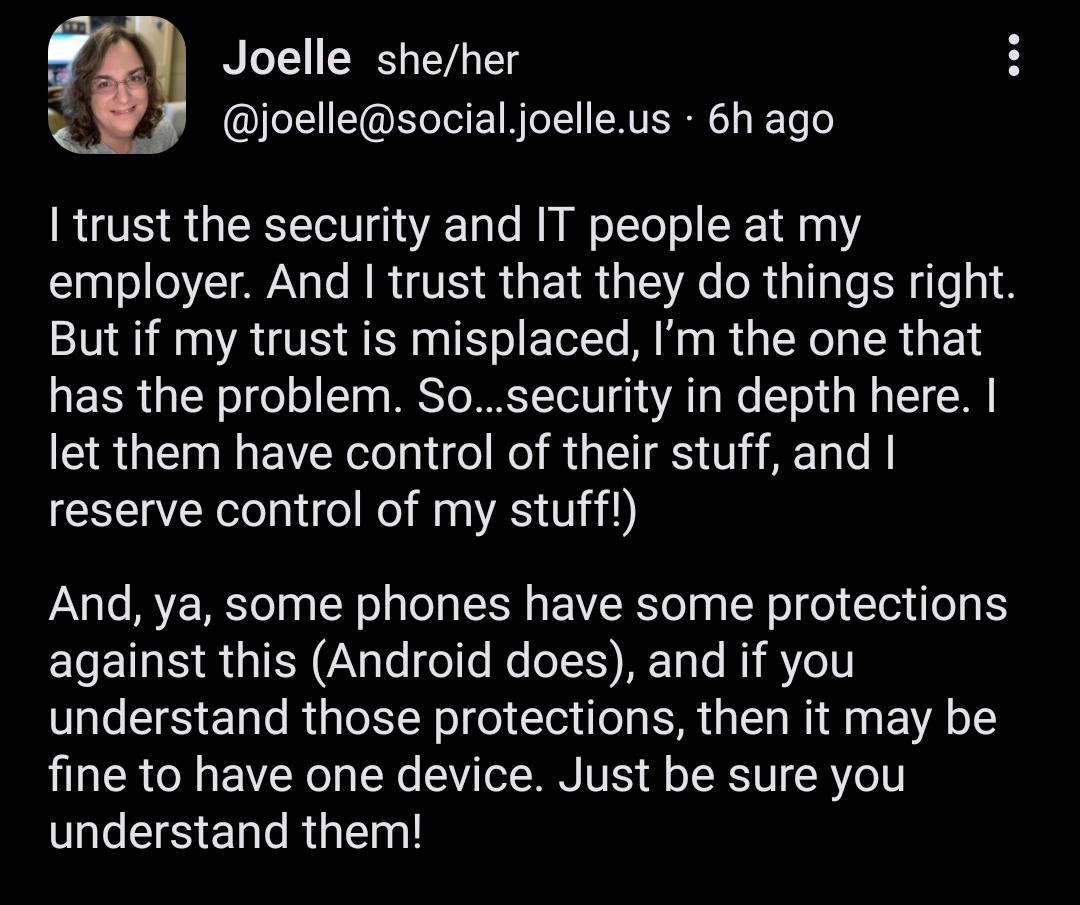this post was submitted on 22 Jan 2024
678 points (94.5% liked)
People Twitter
5456 readers
581 users here now
People tweeting stuff. We allow tweets from anyone.
RULES:
- Mark NSFW content.
- No doxxing people.
- Must be a pic of the tweet or similar. No direct links to the tweet.
- No bullying or international politcs
- Be excellent to each other.
- Provide an archived link to the tweet (or similar) being shown if it's a major figure or a politician.
founded 2 years ago
MODERATORS
you are viewing a single comment's thread
view the rest of the comments
view the rest of the comments


So if the info it provides is very limited, why are companies pushing for it? Why should I install it on my personal phone so I can access Teams and Outlook?
Protection from liability and often a requirement of insurance.
Because if you are accessing company data, the company needs to ensure it’s safe. If you don’t want outlook or Teams access, you don’t have to enroll your device. In some cases companies will purchase a corporate owned device for you. An MDM allows companies to restrict copying data from work to personal and vice versa. If your device gets stolen and is compromised, it allows the company to wipe it. It can also locate the decide if it’s lost.
So is having MDM useless if you also have corporate webmail? Because not having MDM on my phone means I just go to my webmail site on my phone for email, and I can copy there if I need to.
Google's "Find Device" allows for finding and wiping a device by default on Android.
So it's really just those two features? Doesn't really seem worth the hassle unless there's something else they're getting out of it.
The data is valuable and it provides some amount of data security. Any MDM worth a shit will wall off your Android with a work profile and that’s the only part that’s actually controlled by the MDM. They can also mandate a minimum level of security before accessing the work profile.
Webmail can be used as a workaround, but allowing it is more of a convenience issue than a security consideration. Depending on your security team it could be a major hole or not an issue. Authentication requirements can offset the vulnerabilities somewhat, such as short timeouts, MFA, etc.
In my experience, users like you are what make MDM a requirement in any environment. People that refuse to participate in any security processes because they think they know better than the people whose job is literally cybersecurity are almost always the cause of major incidents. That’s how my current employer got a huge ransomware attack and why I’m not allowed to install anything on my phone or laptop without spending several hours on hold with the help desk.
Gotta love getting down voted for trying to learn more about a topic. Looks like Reddit culture is seeping in here.
Anyway, when you say:
What does that mean? I thought MDM was just making it so I couldn't copy data and that my employer could wipe/locate my phone. But it sounds like you're saying it's actually doing something more like creating a separate environment, almost like a VM, on my phone? Or is it different than that? My work MDM said they want to look at applications that you have installed. That was too much of a privacy invasion for me, so I chose not to use work apps on my phone.
Yeah, our IT systems would be exponentially more secure if we didn't have users too. One can dream, I suppose.
That’s something that I never understood, is the claim that default OS is just not secure… well then put all your dev hours into fixing that…